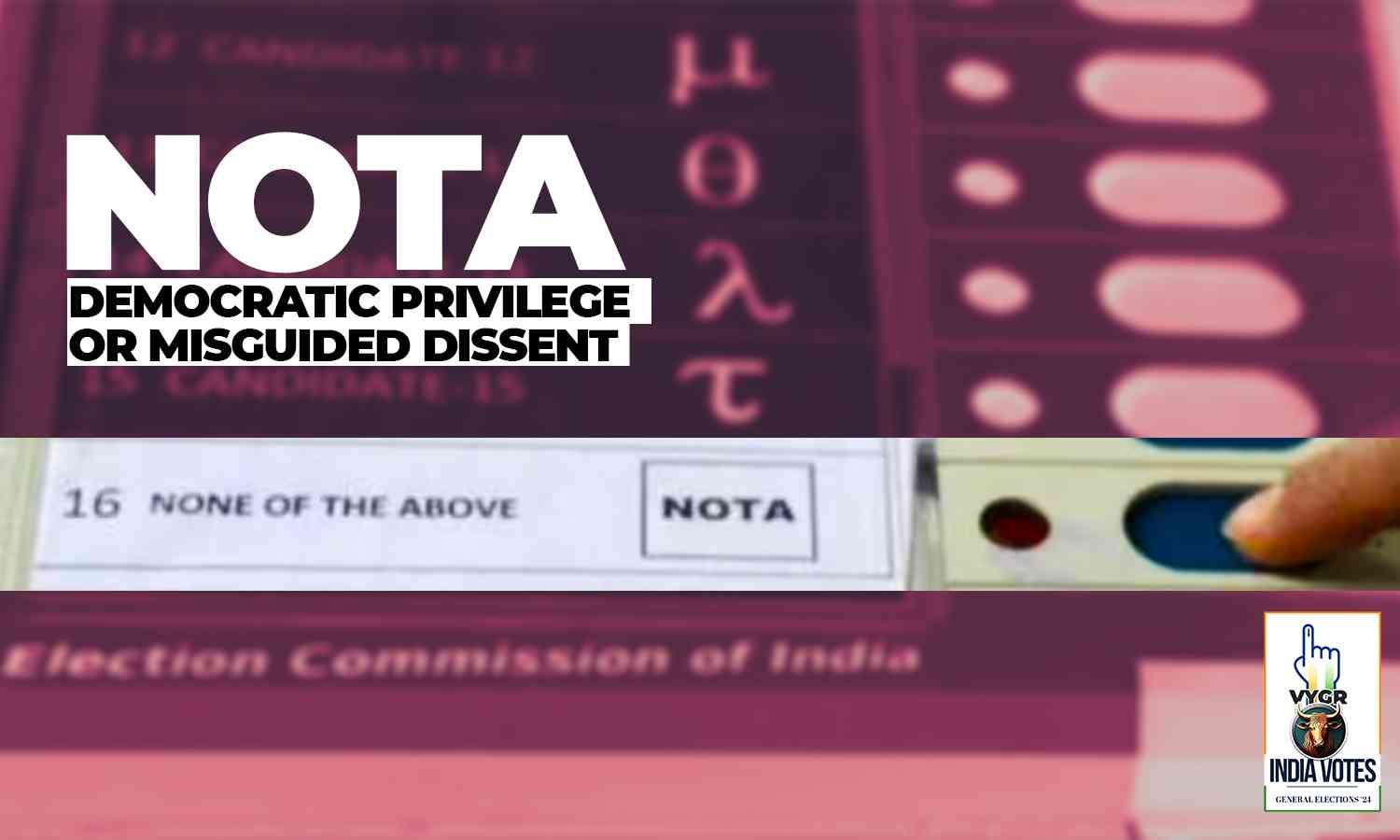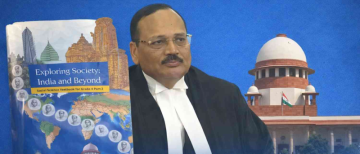![NOTA - Democratic Privilege or Misguided Dissent [India Votes]](https://vygrnews.com/uploader/top-view-elections-concept-with-copy-space copy_1712389560.jpg)
Mandatory Disclaimer to avoid being Raided or Sued by the powers that be:
(Best read in a monotonous, almost robotic voice of a bored teenager) - “The introduction of NOTA was a significant development of the Indian Electoral Process, with the Supreme Court of India recognising its importance in fostering transparency and accountability in elections. By offering the NOTA option, voters are empowered to signal their disapproval of all candidates, thereby exerting pressure on political parties to field more credible and ethical candidates. The presence of NOTA encourages parties to nominate individuals with cleaner records and higher integrity, as they become aware of the electorate's growing demand for better representation.
In essence, NOTA serves as a mechanism for voters to exercise their right to reject all candidates presented to them, effectively expressing their discontent with the available choices. This option aligns with the principles of democracy, ensuring that voters have the freedom to voice their opinions even when none of the candidates meet their expectations. The introduction of NOTA signifies a step towards enhancing the democratic process in India by providing voters with a means to express their dissatisfaction and demand higher standards of governance and representation.”
![NOTA - Democratic Privilege or Misguided Dissent [India Votes]](https://vygrnews.com/uploader/5968_1712389045.jpg)
Having said that…
NOTA is that Sulky Offspring of the Electoral Process
NOTA, which stands for "None of the Above," provides voters in India with the option to express their dissatisfaction with all the candidates contesting in an election. This choice becomes relevant when a voter does not support any of the candidates but still wishes to participate in the electoral process. Which is great if you think non-participation is participation enough. Which, is not. NOTA, on the onset, looks like a power move, but what it really is an in-built filtering process, that takes out all the dissenting voices out of the game, and makes them sit on the sidelines. Worse still, the people who vote NOTA are incredibly proud of the fact that they wasted their voice to say nothing, and vote to not choose sides. Wrap it in whatever sheet you want, tell me that not voting is voting, that the choice to stay neutral is not privilege, but do not come flexing on me as if you did something. You did nothing, you did less than nothing. You stood up to stay quiet. What an utter disrespect for the ones who actually take their vote seriously, and all the ones who fought to get us this power. What a spit on the faces of our brave freedom fighters indeed, of the past & now.
History of NOTA:
Just so you know, NOTA is not an Indian invention. Like so many things, we imported it from the good old divided states of ‘murika - The concept of a "None of the Above" (NOTA) ballot option traces back to 1976 when the Isla Vista Municipal Advisory Council in California, USA, passed a resolution to include this option in the official electoral ballot for the County of Santa Barbara. This innovative move aimed to provide voters with a mechanism to express their dissatisfaction with the available candidates in an election. The introduction of NOTA was a response to the growing sentiment among voters who felt that none of the candidates adequately represented their interests or values. By incorporating NOTA into the ballot, the Isla Vista Municipal Advisory Council sought to empower voters and promote greater transparency and accountability in the electoral process. The adoption of NOTA in Santa Barbara County marked the beginning of a broader movement towards electoral reform, with other jurisdictions and countries subsequently considering or implementing similar measures.
Before NOTA, How did a voter register a negative vote?
Before the introduction of the "None of the Above" (NOTA) option in India, voters did not have a formal mechanism to register a negative vote. In 2009, the Bharatiya Janata Party (BJP) committee approached the Supreme Court of India, requesting the inclusion of a NOTA option on the ballot. They argued that such an option would grant voters the freedom to reject all candidates if they deemed them unworthy. Subsequently, the People's Union for Civil Liberties (PUCL) filed a public interest litigation (PIL) in favour of NOTA. After extensive legal proceedings, on September 27, 2013, the Supreme Court of India ruled in favour of implementing the right to register a "None of the Above" vote in elections. The court directed the Election Commission of India to ensure that all electronic voting machines (EVMs) are equipped with a NOTA button, thereby providing voters with the option to choose "none of the above" if they so desire. This landmark decision marked the formal introduction of NOTA in the Indian electoral system, empowering voters with the ability to express their dissent or dissatisfaction with the available candidates.
NOTA for the first time voters:
Voting serves as a formal declaration of preference between multiple candidates or courses of action, typically indicated through a ballot or a show of hands. It extends beyond political elections to various contests in schools, music reality shows, dance competitions, and more. It's a means for individuals to articulate their preferences based on their knowledge and perspective. The accumulation of votes determines the victor in each contest.
In recent years, NOTA has garnered significant traction across the country, with many individuals opting to cast their votes for NOTA during elections. The emergence of NOTA has brought forth various effects, each with its own set of advantages and disadvantages. According to information from Wikipedia, the Election Commission of India (ECI) has clarified that even if the number of votes against NOTA surpasses the votes secured by candidates in an extreme scenario, the candidate with the highest number of votes among the contesting candidates will still be declared the winner. This means that regardless of the number of votes cast for NOTA, the candidate with the most votes will ultimately prevail.
Pros and Cons of NOTA in points as per me:
Here are somethings I believe the optimists think NOTA can do:
Exercise of Freedom: NOTA provides all citizens of India with the privilege to abstain from voting for any candidate, thus upholding their right to freedom of choice. It empowers individuals to express their dissatisfaction with the available options.
Selection of Meritorious Candidates: By allowing voters to reject all candidates, NOTA creates a scenario where only the most eligible and honest candidates stand a chance of getting elected. This can potentially lead to the elevation of candidates with stronger ethical standards and capabilities.
Increased Voter Turnout: The availability of NOTA encourages more people to participate in the voting process. Even those who are dissatisfied with the candidates can now engage in the electoral process by registering their protest through NOTA. Consequently, this contributes to higher polling percentages, enhancing the democratic representation of the population.
Promotion of Clean Candidates: NOTA makes theoretical sense as a tool to encourage political parties to field candidates with clean backgrounds and ethical integrity. By providing voters with the option to reject all candidates, NOTA exerts pressure on parties to nominate individuals who are free from criminal or immoral backgrounds. This promotes accountability and transparency in the electoral process.
Enhanced Representation: The presence of NOTA must have been pitched as a something that ensures that voters have the opportunity to express their dissatisfaction with the available choices. This empowers citizens to demand better representation and governance by signalling their preference for candidates who uphold higher standards of conduct and morality.
Potential for Political Change: I agree that on paper, if implemented effectively, NOTA has the potential to bring about significant changes in the political landscape of the country. By discouraging the participation of candidates with questionable backgrounds, NOTA can contribute to the emergence of a more ethical and responsible political class, thereby fostering positive societal development.
However, this is what I think the real impacts of NOTA are:
It Discourages Voters with a Dud Option: Many individuals view the NOTA option as a futile exercise, considering it a waste of both vote and time. This sentiment arises from the belief that selecting NOTA does not contribute to the selection of a candidate and thus holds no tangible impact on the election outcome. If what I’m doing means nothing, does nothing - why will I make the effort to do it. The prevalence of NOTA can inadvertently influence other voters. When individuals observe a widespread trend of selecting NOTA, it may sow seeds of doubt regarding their own choices. This phenomenon could lead to a sense of disillusionment among voters, as they question the efficacy of their decision-making process.
NOTA has Limited Influence on Election Results: Despite the potential for a significant portion of the electorate to choose NOTA, the rules stipulate that the candidate with the highest number of votes will still be declared the winner. This means that even if a substantial majority opts for NOTA, the eventual winner may not reflect the collective preference of the population. Political parties often prioritise winning over addressing concerns related to NOTA. Consequently, there is minimal emphasis placed on understanding and responding to the sentiments expressed through NOTA selections. This lack of attention further diminishes the perceived significance of the NOTA option in shaping electoral outcomes.
Before NOTA, there was Rule 49-O?
Rule 49-O, as outlined in the Conduct of Elections Rules, 1961, provides a mechanism for voters who choose not to cast their vote during an election. According to this rule, if an elector, after having their electoral roll number duly entered in the register of voters and having signed or provided their thumb impression in Form-17A, decides not to record their vote, a remark to this effect is made against their entry in Form 17A by the presiding officer. Additionally, the elector's signature or thumb impression is obtained against this remark.
The key difference between Rule 49-O and NOTA lies in the aspect of voter secrecy. Prior to the introduction of NOTA, Rule 49-O did not provide voter secrecy. It allowed polling officers to ascertain the reason for a voter's rejection of all candidates through the remarks made in Form 17A. This meant that the voter's decision not to vote was not kept confidential, potentially compromising their privacy.
However, with the advent of NOTA, Rule 49-O was effectively rendered obsolete. NOTA, or "None of the Above," ensures voter secrecy by allowing voters to reject all candidates without revealing their individual choices. Unlike Rule 49-O, NOTA does not permit polling officers to discern the reasons behind a voter's rejection of candidates. Instead, it protects the voter's identity and preserves the concept of personal choice, thereby upholding the principle of secrecy in the electoral process.
While both Rule 49-O and NOTA cater to voters who choose not to vote for any candidate, NOTA distinguishes itself by ensuring voter secrecy and safeguarding the individual's right to privacy and personal choice during elections.
![NOTA - Democratic Privilege or Misguided Dissent [India Votes]](https://vygrnews.com/uploader/2151070659_1712389780.jpg)
While NOTA was introduced with good intentions, several countries that initially implemented it later chose to discontinue or abolish the system. This suggests that NOTA may have drawbacks or limitations that render it ineffective or undesirable in certain contexts.
Mostly because a lot of them realised that NOTA is a recipe for potential Electoral Deadlock. In countries where electronic voting machines feature a NOTA button, there is a possibility that NOTA could receive a majority of votes, effectively "winning" the election. However, this poses challenges for election commissions, as they must decide how to proceed in such a scenario. Options may include leaving the office vacant, appointing a candidate, or conducting a new election, each of which presents logistical and practical difficulties.
As mentioned above, I truly believe that NOTA, however noble & brainy, fails to make any kind of impact. Like communism, it’s great as a theory. But just like communism, when really brought into action, leads to absolute inaction. Is NOTA an evolution to the electoral process? Yes, one hundred percent. Is the political class, voter class, democratic processes in our great nation evolved to catch up to it? Well, I leave it to you to decide. Are we in a place where we can afford to not take a side and it will lead to a better nation? I leave that answer to you as well. Not because I don’t have those answers, I do. What I don’t have however, is the confidence that I am allowed to run my mouth, spit facts or pull opinion out of my plump posterior with out fear of state machinery piling down on me? No. So I will vote, I will use my one singular voice to choose the side I think is better for the nation. And I hope you do too, and not take a childish approach to a critical election. To end, all this is obviously just my opinion, which you can agree or disagree with, and we can sit down to have a friendly open conversation, or you can make your own opinion and go from there. These are just words, they cannot hurt you. They are not meant to, they are there to show that it hurts me seeing you waste your voice.
Go Vote.
![NOTA - Democratic Privilege or Misguided Dissent [India Votes]](https://vygrnews.com/uploader/top-view-paper-style-voting-assortment_1712389801.jpg)
*The views expressed in this article are personal. They do not reflect the opinions, beliefs, or positions of Vygr and Vygr Media Private Limited.



![NOTA - Democratic Privilege or Misguided Dissent [India Votes]](https://vygrnews.com/uploader/5267_1712389609.jpg)
![NOTA - Democratic Privilege or Misguided Dissent [India Votes]](https://vygrnews.com/uploader/2151070882_1712389643.jpg)
![NOTA - Democratic Privilege or Misguided Dissent [India Votes]](https://vygrnews.com/uploader/5267_1712389692.jpg)
![NOTA - Democratic Privilege or Misguided Dissent [India Votes]](https://vygrnews.com/uploader/2151015984_1712389731.jpg)






















